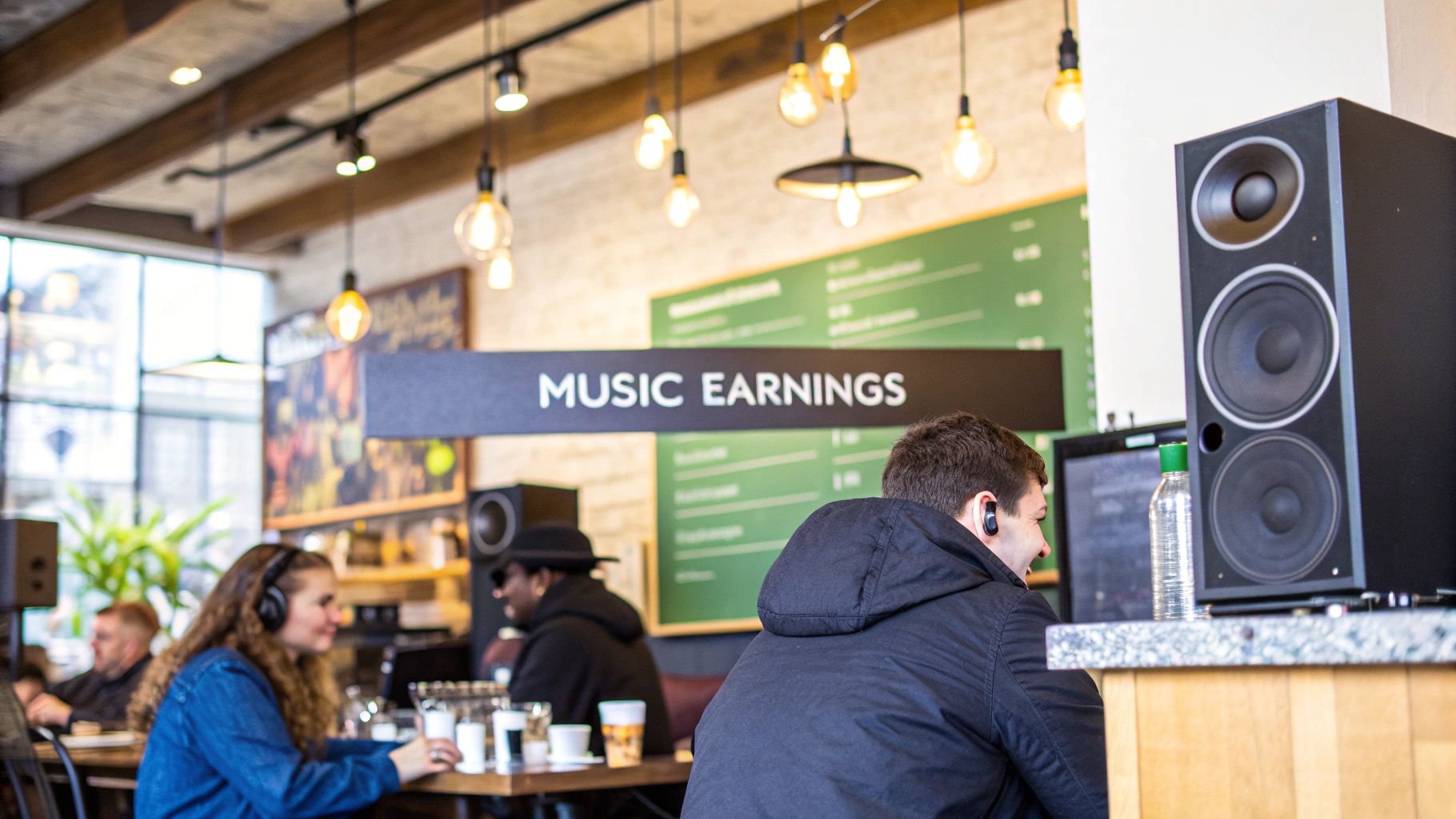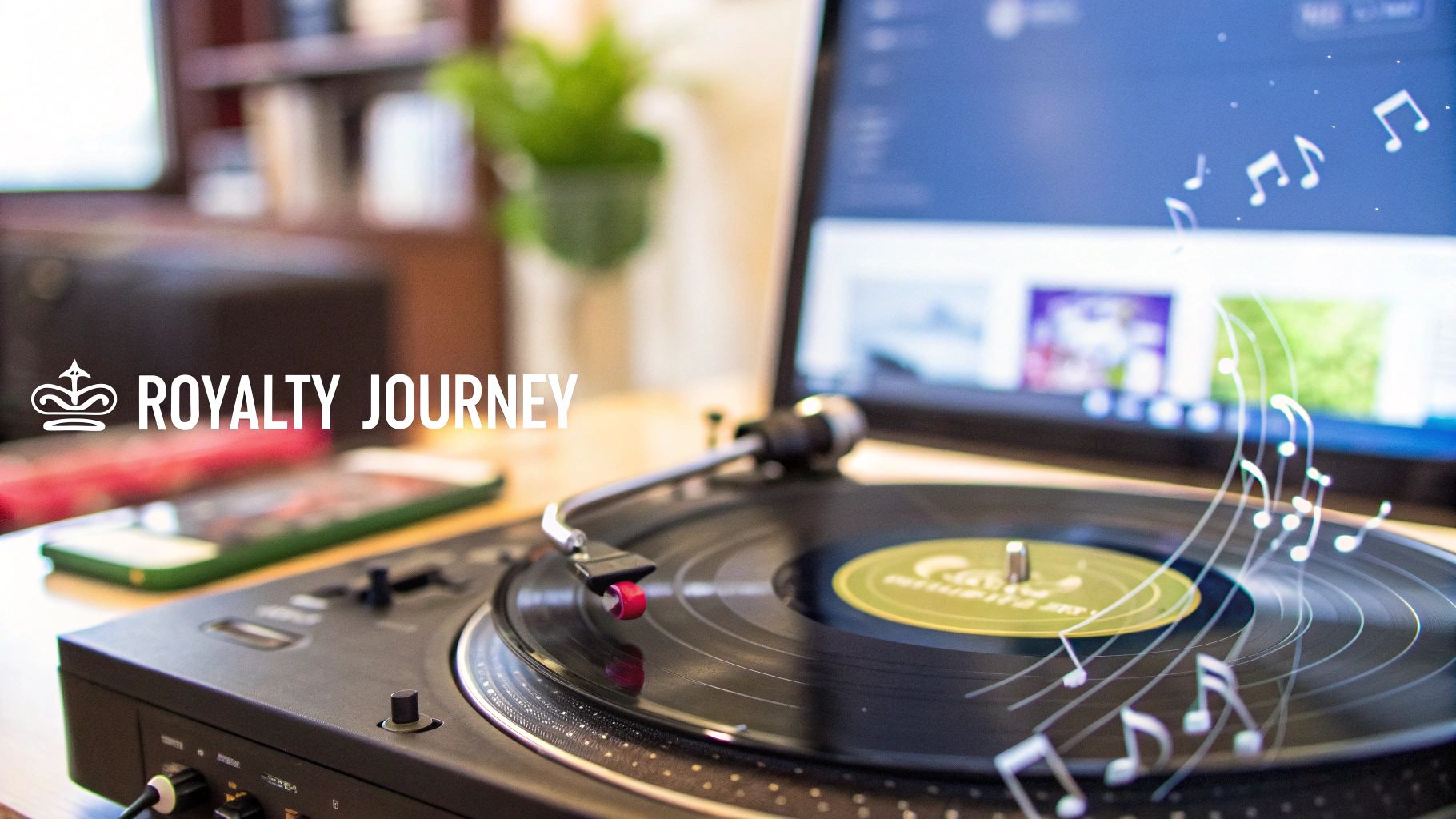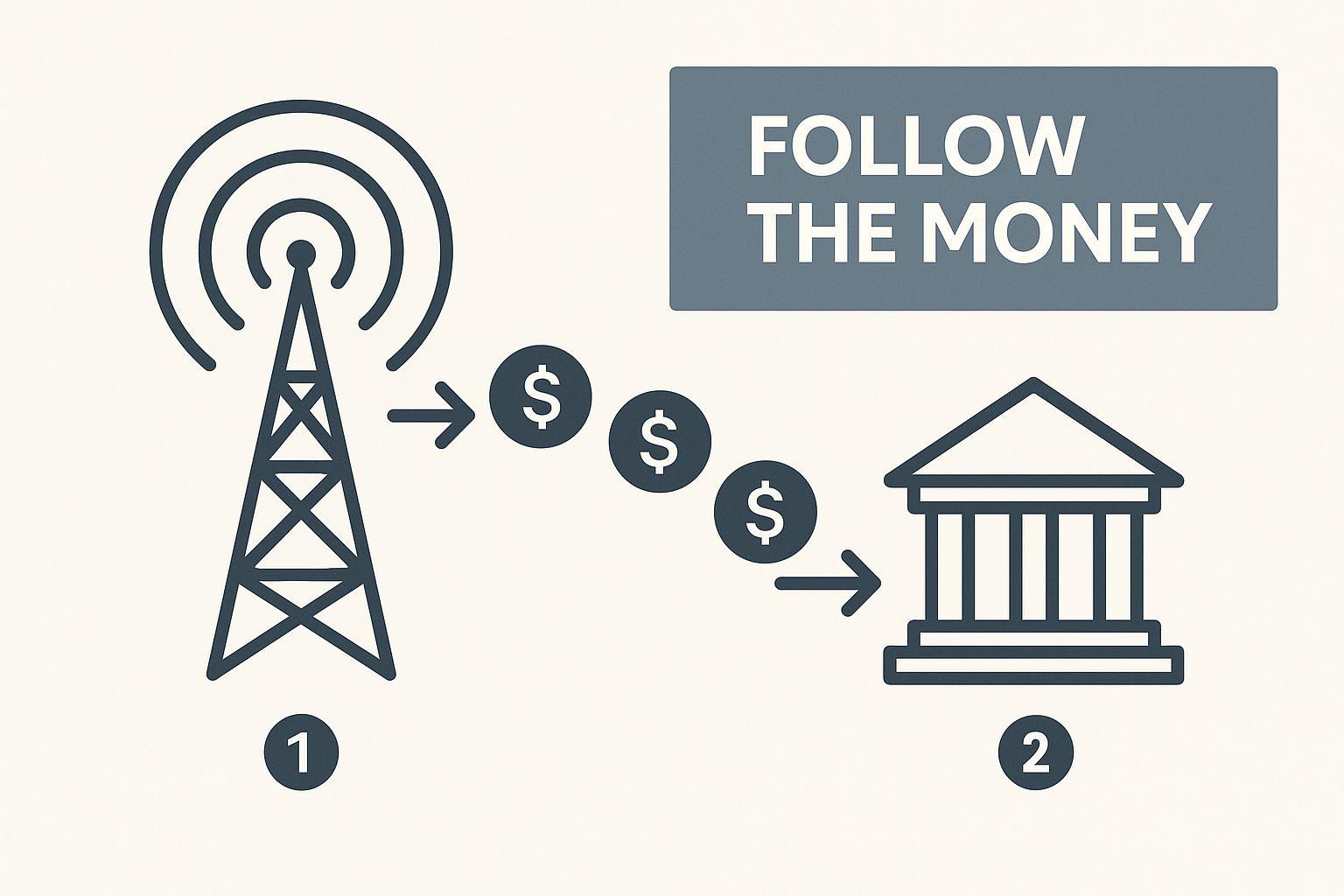Performance royalties are the payments made to songwriters and publishers whenever their music is performed or broadcast publicly. In plain English, if your song gets played on the radio, streamed online, or performed live in a venue, you've earned money.
Understanding Your Music's Earning Power
Picture this: your latest track is playing in the background at a local coffee shop. Maybe it's spinning on a college radio station, or it even got picked for a scene in a TV show. Each one of those "public performances" generates a small but crucial fee.
That fee is a performance royalty, and it's a fundamental income stream for anyone creating music.
Think of your song as a piece of real estate. Any business that wants to "rent" it to entertain their customers鈥攚hether it's a bar, a radio station, or a streaming service鈥攈as to pay a small fee for that use. One single play won't make you rich, but when you add up thousands of plays from all over the world, it becomes a serious source of revenue.

Who Earns Performance Royalties?
It's critical to know exactly who gets paid. Performance royalties are specifically for the creators of the musical composition鈥攖he song itself, meaning the melody and lyrics. This income is generally split between two parties:
- Songwriters: The people who actually wrote the music and lyrics.
- Publishers: The companies or individuals who represent the songwriters and help manage their compositions.
This system is designed to make sure the creative minds behind the music get their fair share. And it's no small change. Major Performing Rights Organizations (PROs) like ASCAP and BMI have been distributing over $1 billion annually in the U.S. alone since 2017. If you're new to this, exploring a beginner's guide to music royalty types can help you see how these royalties fit into the bigger financial picture.
To make things even clearer, let's break down the key players and what they do in a simple table.
Performance Royalties at a Glance
This table offers a quick snapshot of the essential roles and concepts you'll encounter when dealing with performance royalties.
| Concept | Who It Is | What They Do |
|---|---|---|
| Songwriter | The creator of the lyrics and/or melody. | Earns a share of royalties for the public use of their composition. |
| Publisher | A company that represents the songwriter. | Administers, promotes, and collects royalties on behalf of the songwriter. |
| PROs | Organizations like ASCAP, BMI, SESAC. | License compositions, collect royalties from users, and distribute them. |
| Music Users | Radio, TV, venues, streaming services. | Pay license fees to PROs for the right to play music publicly. |
Essentially, the PROs act as the bridge between the thousands of businesses using music and the songwriters who create it, ensuring everyone gets paid correctly.
The core idea is simple: if your music is performed in public, a royalty is owed. This covers everything from live concerts and radio spins to TV broadcasts, streaming, and even the background music in bars or on airlines.
Grasping this principle is the first step toward claiming the money your music is rightfully earning. For a deeper dive, you can learn more about music royalties explained by legal experts to understand the full scope of your potential income.
Tracing the Birth of a Royalty Every Time Your Song Plays
Let鈥檚 think about your song like a piece of real estate you own. Anytime someone uses that property in public鈥攚hether it's a radio station broadcasting it to thousands or a local coffee shop playing it for their customers鈥攖hey owe you a little bit of "rent." That payment is the performance royalty, and it鈥檚 generated the very moment your music is performed for the public.
But what really counts as a "public performance"? The definition is a lot broader than most musicians think. It isn't just about a packed stadium show. A royalty is born from a huge range of uses, and each one is tracked and reported in its own way.

Where Royalties Are Born
Performance royalties get triggered across tons of different platforms and venues. Here are the most common places your song is probably earning money right now:
- Terrestrial Radio and TV: When your track gets played on a traditional AM/FM station or shows up in a TV show, that's a performance. These stations report their playlists to Performing Rights Organizations (PROs), who then do the math to figure out your payment.
- Digital Streaming: This is a big one. It covers plays on interactive services like Spotify and non-interactive digital radio like Pandora. These platforms send massive amounts of data directly to the PROs, detailing every single stream.
- Live Venues: Every single time your song is performed live, whether it's by you or a cover band at a bar, concert hall, or festival, royalties are generated. Venues pay annual license fees for the right to have music performed on their stage.
- Businesses: Ever wonder about the background music in a retail store, restaurant, or gym? That counts, too. These businesses pay for blanket licenses that give them a legal pass to play a huge catalog of music.
The key thing to remember is that a performance doesn't have to be "live" in the old-school sense. A broadcast or a stream is legally considered a public performance, which creates a direct line for royalties to flow from the listener back to you, the songwriter.
This whole system is built on a complex web of legal agreements. To get a better handle on the basics of music income and how these royalties get triggered, a great next step is digging into a guide on . On that same note, understanding how these licenses are managed is a huge part of the puzzle, and our guide on music publishing explained can clear up that critical piece of the process.
Meet Your Royalty Collection Team
So, how does the money from a song played in a coffee shop across the country actually make it back to you? You don鈥檛 have to go knocking on doors yourself, thankfully. There鈥檚 an entire system of organizations built to handle this, acting as the critical link between the people who use music and the people who create it.
At the center of it all are the Performing Rights Organizations (PROs). Think of them as the toll collectors on the music industry highway. It would be an absolute nightmare for a songwriter to track down every single radio station, bar, or streaming service playing their music. On the flip side, it鈥檚 just as impossible for a business to hunt down every single songwriter to ask for permission.
PROs fix this mess by stepping into the middle. The major PROs in the United States are ASCAP (American Society of Composers, Authors and Publishers), BMI (Broadcast Music, Inc.), and the invite-only SESAC and GMR. If you want to dive deeper, you can check out our guide on what music performance rights organizations are and how they work.
Who Does What in Performance Royalties
To really get the full picture, it helps to break down who's involved and what their job is. It's a team effort, and each player has a specific, vital role in making sure the money flows correctly.
| Player | Role | Primary Responsibility |
|---|---|---|
| Songwriters & Publishers | The Creators | You write the music and own the musical composition. You sign up with a PRO to collect royalties for you. |
| Performing Rights Organizations (PROs) | The Collectors | They issue licenses, track public performances, collect fees from music users, and pay royalties to creators. |
| Music Users | The Licensees | This is anyone playing music publicly鈥攔adio, TV, streamers, restaurants, venues. They pay license fees to PROs to legally use their catalogs. |
This table gives you a simplified look, but it highlights how each piece of the puzzle fits together to create a functional system for everyone.
At the end of the day, PROs do the heavy lifting. They handle the complicated legal and administrative work of licensing and collection so that you can focus on making music, confident that you鈥檒l get paid when your work is performed.
This tried-and-true model isn't static, either. The industry is always exploring new ways to do things. For example, artist-centric payment models, like those being tested by services such as Deezer in France, could shake up how royalties are split. These shifts could mean songwriters and publishers see an even fairer share in the years to come. You can find more on .
Follow the Money from the Radio to Your Bank Account
Knowing how performance royalties are generated is one thing, but actually seeing how that money travels from a speaker to your bank account is where it all clicks. The whole process might seem a little complicated from the outside, but it follows a pretty clear path designed to make sure artists get paid for their work.
It all starts with the music users. This is a broad category that includes everyone from your local radio station and a national TV network to a neighborhood bar or a giant like Spotify. These businesses pay annual blanket license fees to Performing Rights Organizations (PROs) for the legal right to play anything from their massive catalogs. Think of this fee as their all-access pass to legally play music.
This infographic breaks down how a single spin on the radio eventually turns into a deposit in your account.

As you can see, the money flows from the users to the collectors (the PROs), who then get it to the creators. It's a multi-step journey, but it works.
The PROs' Role in Distribution
Once a PRO collects all those license fees, their real work begins. They have to figure out who to pay and how much. To do this, they use a mix of methods鈥攚e're talking data from streaming services, detailed playlists from radio stations, and even setlists from live shows鈥攖o track which songs were played and how often.
After taking out their own operational costs, the PROs divide up the remaining pool of money.
The standard industry practice is to split performance royalties right down the middle: 50% goes to the songwriter(s), and the other 50% goes to the publisher(s). You'll often hear this called the "writer's share" and the "publisher's share."
Here's the kicker: if you don't have a publisher, your PRO will hold onto that publisher's share. It just sits there until you either sign with a publisher or, as many independent artists do, set up your own small publishing company to collect it. This is a crucial final step if you want to get every cent you've earned.
Why Your Music Has Global Earning Potential
Performance royalties aren't stuck inside one country's borders. Your music can earn you money from a coffee shop in Tokyo just as easily as it can from a radio station in your hometown. That鈥檚 because the whole world of music royalties is built on a massive, interconnected global network.
Think about it: every single time your song gets played in another country, you are owed a payment. The internet has basically erased the old geographical lines, letting a track you release in the United States find fans anywhere with a Wi-Fi signal. This isn't just cool; it's a powerful engine for your income.
The Power of International Agreements
So, how does this actually work? Do you need to sign up for dozens of different collection societies all over the world? Thankfully, no. Performing Rights Organizations (PROs) in different countries have what are called reciprocal agreements with each other.
It鈥檚 kind of like an alliance of royalty collectors. Your home PRO (like or ) partners up with international PROs (like PRS in the UK or GEMA in Germany). When your song gets played overseas, the system kicks in:
- The local PRO in that country collects the royalty for you.
- They then send that money back to your home PRO.
- Finally, your PRO pays it out to you, right there on your regular statement.
This teamwork ensures that no matter where your music finds an audience, the performance royalties make their way back to you.
Globally, performance rights revenues pull in a huge 9.7% of total recorded music revenues. And we're seeing massive growth in new markets. Latin America, for instance, saw a 22.5% jump in recorded music revenues, with major gains in places like Brazil (21.7%) and Mexico (15.6%). You can dig deeper into these numbers in the IFPI's report on .
What this all means is that the global market is wide open. There are more opportunities than ever for your music to build a steady, worldwide income stream.
Your Action Plan to Claim Every Royalty You've Earned
Knowing what performance royalties are is one thing, but actually getting paid is a whole different ball game. This money doesn't just magically appear in your bank account. You need a solid, proactive plan to grab every single cent you've earned from your music.
Don't worry, this isn't rocket science, but it does require you to be organized. Think of it like setting up the plumbing for your income鈥攄o it right the first time, and the cash can flow for the rest of your career.
The Essential First Steps
The whole system for collecting your performance royalties boils down to your relationship with a Performing Rights Organization (PRO). Without joining one, any royalties you earn are basically lost money, just sitting out there unclaimed.
Here's your simple, must-do checklist:
- Join a PRO Immediately: This is completely non-negotiable. If you're a songwriter in the U.S., you need to affiliate with a PRO like ASCAP or BMI. This is what officially puts you on the map and gives them the legal muscle to collect money for you.
- Register Every Single Song: Once you're in, you have to meticulously register every single song you've written in your PRO鈥檚 online portal. Be specific. Include the official title, all your co-writers, and the exact ownership percentages. An unregistered song is an invisible song鈥攊t literally can't earn you a dime.
- Submit Your Live Setlists: Playing gigs? Your PRO has a system (like ASCAP OnStage) where you can upload your setlists from every show. Venues pay big annual fees to license the music played on their stages, and submitting your setlists is the only way you can get your cut of that money.
Taking care of these administrative steps is just as creative and important as writing the song itself. This is the business side of your art, and getting it right is how you build a real, sustainable career.
And as that royalty income starts to grow, it鈥檚 smart to think about your financial future. Looking into can be a huge help in managing your earnings and building long-term wealth from your music.
Common Questions About Performance Royalties
Even with a good grasp of the basics, the world of performance royalties can get a little confusing. Let鈥檚 clear up a few of the most common questions songwriters run into to make sure you鈥檙e feeling solid about your earnings.
Performance vs. Mechanical Royalties: What鈥檚 the Difference?
This is a big one. It's probably the most common point of confusion for new artists.
Think of it like this: a performance royalty is for the public performance of your song. It's the money you earn when your composition is played out in the world鈥攐n the radio, on a streaming service, on TV, or at a live show.
A mechanical royalty, on the other hand, is for the reproduction of your song. It's generated whenever a copy of that song is made. This used to mean physical stuff like CDs and vinyl, but today it primarily applies to on-demand streams and digital downloads, because each stream is legally considered a new "copy."
Do I Need a Publisher to Collect My Share?
The short answer is no, not entirely. When you join a PRO like or , they will pay your 50% writer's share of performance royalties directly to you. That half is yours, no publisher needed.
However, the other 50%鈥攖he "publisher's share"鈥攊s a different story. The PROs will only pay that portion to a registered publishing entity. This is why you see so many independent artists setting up their own "vanity" publishing company. It's a simple move that allows them to collect the other half of their earnings.
How Long Does It Take to Get Paid?
You鈥檒l need some patience here. PROs usually pay out quarterly, but there's a pretty significant lag time.
It can take anywhere from six months to over a year for royalties from a performance to finally get processed and show up in your statement. The delay comes from the massive amount of work involved: collecting performance data from thousands of sources, processing payments from all those licensees, and then calculating exactly who gets what.
At Cordero Law, we help artists and entrepreneurs protect their creative work and build sustainable careers. If you need guidance on music publishing, intellectual property, or entertainment law, we鈥檙e here to help you understand every note of your business. Learn more at .
